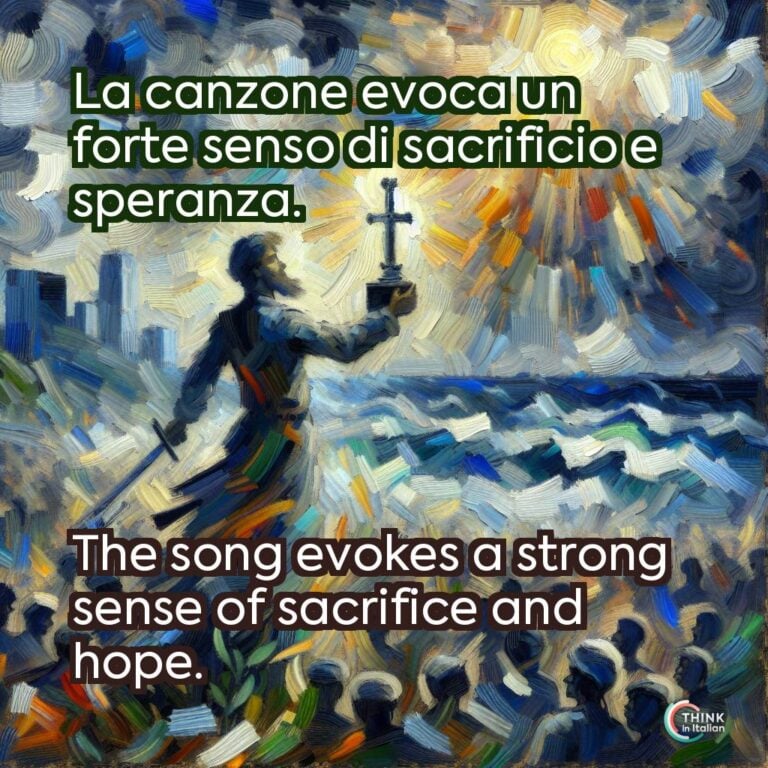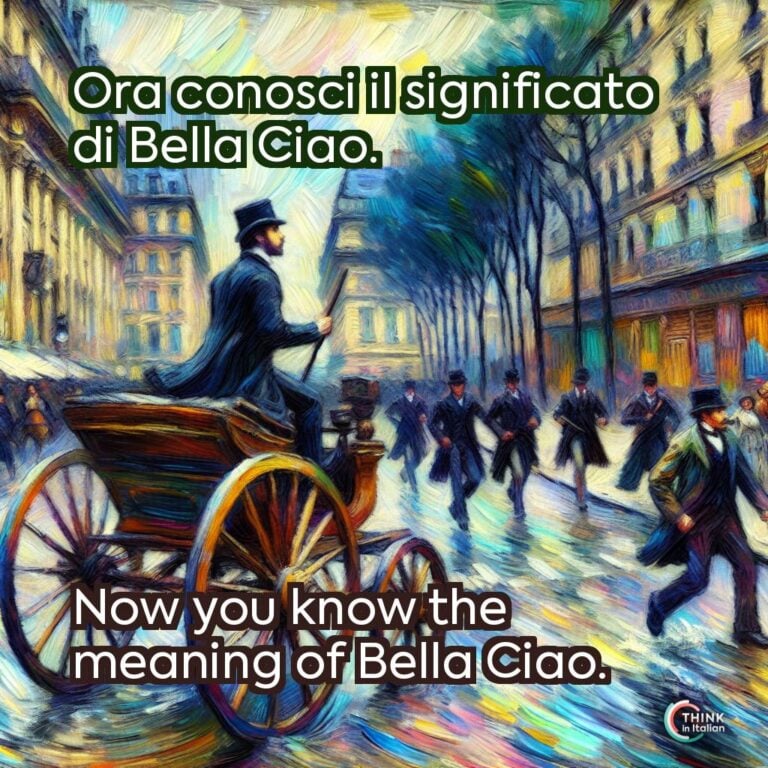Bella Ciao
Bella Ciao is an Italian folk song that is associated with the Italian partisans during World War II. However, there are conflicting stories about the origin of Bella Ciao.
Some believe it comes from Dalmatia, others say it was composed by partisans during the Italian Resistenza, but the most likely theory claims that Bella Ciao was probably written by the mondine, the women who worked in paddy fields in Northern Italy in the early 20th-century.
According to this theory, the song’s original version described the atrocious working conditions faced by the workers who sung hope for a better future. Later on, the song was changed to tell the story of the anti-fascist resistance in WWII, and the lyrics became those we know today.
Over the years, Bella Ciao became a symbol of resistance and freedom worldwide. It’s been adopted and adapted by different cultures and political groups, reinforcing its universal meaning of struggle and defiance against oppression.
More recently, the song was used in different Netflix series and movies. An important representation is in “La Casa de Papel”, where it is used as an anthem of rebellion, reviving the interest in the song.
Bella Ciao: Explained
What Does “Bella Ciao” Mean?
Literally speaking, Bella Ciao can be translated as “Bye-bye beautiful”. But when it comes to understanding the lyrics, ciao as a greeting acquires different shades of meaning.
Have a look at the Italian lyrics:
Una mattina mi son svegliato,
o bella ciao, bella ciao, bella ciao ciao ciao!
Una mattina mi son svegliato
e ho trovato l’invasor.
O partigiano portami via,
o bella ciao, bella ciao, bella ciao ciao ciao
o partigiano portami via
che mi sento di morir.
E se io muoio da partigiano,
o bella ciao, bella ciao, bella ciao ciao ciao,
e se io muoio da partigiano
tu mi devi seppellir.
Seppellire lassù in montagna,
o bella ciao, bella ciao, bella ciao ciao ciao,
seppellire lassù in montagna
sotto l’ombra di un bel fior.
E le genti che passeranno,
o bella ciao, bella ciao, bella ciao ciao ciao,
e le genti che passeranno
mi diranno «che bel fior.»
Questo è il fiore del partigiano,
o bella ciao, bella ciao, bella ciao ciao ciao,
questo è il fiore del partigiano
morto per la libertà
Now, read the English translation:
One morning I woke up,
oh bella ciao, bella ciao, bella ciao, ciao, ciao! (Goodbye beautiful)
One morning I woke up
And I found the invader.
Oh, partisan carry me away,
oh bella ciao, bella ciao, bella ciao, ciao, ciao
oh partisan carry me away
Because I feel death approaching.
And if I die as a partisan,
oh bella ciao, bella ciao, bella ciao, ciao, ciao
and if I die as a partisan
then you must bury me.
Bury me up in the mountain,
oh bella ciao, bella ciao, bella ciao, ciao, ciao
bury me up in the mountain
under the shade of a beautiful flower.
And all those who shall pass,
oh bella ciao, bella ciao, bella ciao, ciao, ciao
and all those who shall pass
will tell me “what a beautiful flower.”
This is the flower of the partisan,
oh bella ciao, bella ciao, bella ciao, ciao, ciao
this is the flower of the partisan
who died for freedom
Bella Ciao: Meaning of the Lyrics
If you grasped the lyrics of the song, you probably understood its sad message: the song is about the farewell of a partisan to his beloved.
He is preparing to confront the invaders, but he’s aware of the fact that he is going to die. In his final wishes, he asks to be buried on a mountain beneath a flower, hoping it will stand as a symbol “of the partisan who died for freedom”.
These poetic lyrics capture the spirit of a person who prioritizes the well-being and liberty of his community above his own desires, love, and even life. The song’s melancholic tune underlines this sense of solemnity but, at the same time, it gives a sense of hope for a brighter future.
This is why Bella Ciao has made such an impression on the hearts of revolutionaries around the world.






